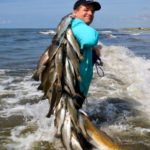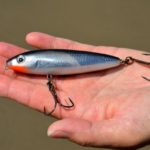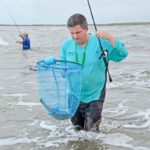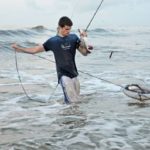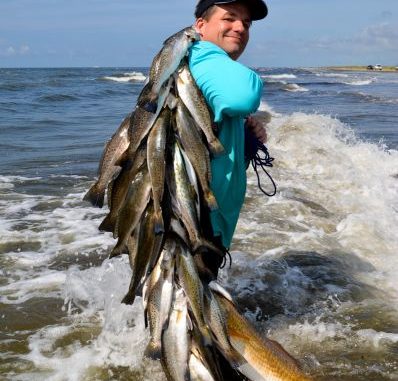
Think it’s too cold to hit the Elmer’s Beach surf? Then you’re going to miss out on the swarms speckled trout patrolling the shallows. Here’s how to capitalize.
“Cripes Sammy! How can you take it?” I asked. “The water has got to be freezing cold in April.”
Sammy Romano flashed his famous ear-to-ear grin.
“Man-up! You just man-up to it!” Romano said. “Besides, it’s not really cold until you get out.”
A week later, I wakened with a groan to Romano thumping at the bedroom door in his Metairie home.
It was 2 a.m.
“I didn’t want to wake you up too early, so I let you sleep 15 minutes longer,” he said as I stumbled into the hall light. “That’s mercy!”
The night before, the Chag’s Sporting Goods manager said, “I don’t need much sleep,” a world-class understatement.
Fifteen minutes later — without a cup of coffee — we were rolling. In sequence, Romano’s partners in crime for this caper joined the caravan.
He hooked up with 54-year-old Cabot Corso in Destrehan. Corso is a Chag’s customer and what Romano described as “a hell of a fisherman.”
In Boutte, 20-year-old Nicholas “Frog” Cioffe’s truck pulled in behind Romano’s. Cioffe is another Chag’s employee and a college student.
It was still dark when Romano pulled off Louisiana State Highway 1 and through the gates of Elmer’s Island Wildlife Refuge.
He hung a left when he hit the beach and ran the truck eastward on the hard beach sand until it dead-ended in Caminada Pass.
After the vehicles’ lights were extinguished and our eyes adjusted to the dark, it was obvious that the gods of Gorillaville were angry.
It looked like a sea of white suds out there — nothing but curling, fast-moving, white breakers.
The guys were itching to get their feet wet, and in pitch blackness waded calf-deep into the water to begin pitching topwater plugs into the frothy water. With just enough light to give them confidence, they moved farther out into the first line of large breakers.
Behind the trio and to the west, I could see a long line of headlights bouncing up the beach toward us, but they were too busy to notice.
The trio started busting speckled trout immediately.
It was often difficult to see the topwater hits in the rolling breakers, but the anglers was steadily wrenching treble hooks from the jaws of fish in the rough water.
A glance behind the men, revealed that the earlier line of headlights had turned into an army of anglers plowing through the breakers toward the three.
Even in the poor light, the blood in their eyes was visible.
Whoever in the Romano crew had the hot hand found himself immediately swarmed by the hungry bunch of late-comers. They crowded so closely that the man had to be careful not to accidentally hook one of them.
This was no place for a fisherman who values solitude or a wilderness experience. Even well after daylight, new anglers continued to wade out from the beach until the fishing became almost cheek by jowl.
The crowd made it difficult to move to find more fish when the bite petered out in a particular spot.
The three Romano crew members fished close enough together to provide interesting contrasts in their techniques.
Cioffe and Corso landed their trout by bravely grabbing their still-active fish with their mouths full of treble hooks from the water with their bare hands.
Amazingly, in spite of landing dozens of the slippery, energetic fish, neither angler ended up with a hook in a hand.
Romano prudently used a landing net that he kept slung over his shoulder.
Of course, that carried its own problem of the treble hooks tangling in the net.
“The treble hooks really aren’t that bad,” Romano explained, “if you get them out of the net’s meshes right away.”
But any slack or dawdling meant a time-consuming mess, made all the worse by the waves steadily punching him.
Courso strung his fish on a surf stringer he kept hooked into a pocket in his shorts.
Romano and Cioffe started with surf baskets, essentially cloth mesh bags fitted into foam rings, tied to their waists by a cord. Part-way through the morning, Romano’s bag came off his ring and he had to shift to a stringer.
Both fish storage methods have advantages. The baskets help protect a fisherman’s catch from marauding sharks (yes, sharks do take fish from stringers occasionally), and they provide a little bit of security as a handy life ring — just in case.
Stringers, on the other hand, are faster to use, and they don’t pull and yank as much in rough water.
And the day was indeed rough.
The waves beat on the men mercilessly. Usually, the anglers turned their bodies sideways to meet oncoming breakers.
A lick taken dead-on from the front invariably pushed them back three steps.
I learned never to turn my back on the waves. It was impossible to anticipate their arrival, and they hit my lower back with a painful force.
No wonder kidney punches are illegal in boxing.
After daylight spread over the water, the topwater bite died.
Corkys, usually Romano’s favorite lure, produced only a hit now and then — but a nearby angler was really nailing specks with tight-lined tandem soft plastics on jigs.
Not one to put pride before production, Romano and Cioffe sloshed back to the beach and trudged to the truck to change to jigs.
The pair hammered the fish pretty well for half an hour, until that bite pooped out.
When it did, they simply slid parallel to the beach on top of the sandbar on which they were fishing until they relocated the fish about three-quarters of a mile from the pass.
The spot offered the advantage of being just a little bit less rough than Gorillaville.
This wasn’t like fishing in Destin, Fla.
The water was a murky green instead of crystal clear. And instead of being white the sand is almost brown and littered with an outlandish assortment of flotsam and jetsam — rotting water lilies and sargassum grass, pieces of crab shells and seashells, empty plastic water bottles, a shoe sole, an empty anti-freeze jug, pieces of poly ropes, a syringe, plastic bags, beer cans, a snuff can and even a beach whistle.
Also, unlike Destin, it had fish — lots and lots of fish.
As it got later, the sun began to break through the clouds. The wind was a rather pleasant breeze from the east — not what produced the ferocious breakers that were the remnants of a disturbance in the Gulf that brought 11 inches of rain to Louisiana the previous week.
It was quite a feat to cast, concentrate on working the lures, land the fish and string them up, all the while having to jump up on every incoming wave to keep them from breaking over their heads.
The stringers got heavy, but the rough water made counting fish impossible, so at 9:30 a.m. they headed to the truck to ravenously attack sandwiches prepared by Corso’s daughter, Alison.
The tally was 62 speckled trout, one redfish, and one Spanish mackerel.
They went back out after eating, but the bite had shut off.
No one complained: They had a lot of fish to clean.
